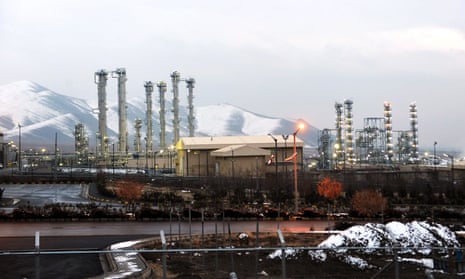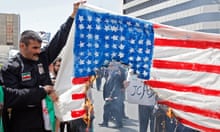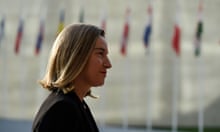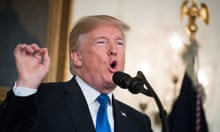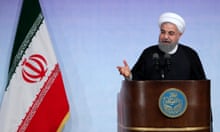Tehran has sped up the countdown to its breach of the nuclear deal with the announcement that it will exceed its uranium stockpile limit in the next 10 days, raising heightened tensions in the region even further.
The country’s atomic agency also said Tehran might also start the process of enriching uranium up to 20%, closer to weapons-grade, from 7 July.
The announcement by Behrouz Kamalvandi, the spokesman for the Iranian Atomic Energy Authority, puts more pressure on Europe to come up with new terms for the 2015 nuclear deal with Iran.
Q&AWhat is the Iran nuclear deal?
Show
In July 2015, Iran and a six-nation negotiating group reached a landmark agreement known as the Joint Comprehensive Plan of Action that ended a 12-year deadlock over Tehran’s nuclear programme. The deal, struck in Vienna after nearly two years of intensive talks, limited the Iranian programme, to reassure the rest of the world that it cannot develop nuclear weapons, in return for sanctions relief.
At its core, the JCPOA is a straightforward bargain: Iran’s acceptance of strict limits on its nuclear programme in return for an escape from the sanctions that grew up around its economy over a decade prior to the accord. Under the deal, Iran unplugged two-thirds of its centrifuges, shipped out 98% of its enriched uranium and filled its plutonium production reactor with concrete. Tehran also accepted extensive monitoring by the International Atomic Energy Agency (IAEA), which has verified 10 times since the agreement, and as recently as February, that Tehran has complied with its terms. In return, all nuclear-related sanctions were lifted in January 2016, reconnecting Iran to global markets.
The six major powers involved in the nuclear talks with Iran were in a group known as the P5+1: the UN security council’s five permanent members – China, France, Russia, the UK and the US – and Germany. The nuclear deal is also enshrined in a UN security council resolution that incorporated it into international law. The 15 members of the council at the time unanimously endorsed the agreement.
On 8 May 2018, US president Donald Trump pulled his country out of the deal. Iran announced its partial withdrawal from the nuclear deal a year later. Trump's successor, Joe Biden, has said that the US could return to the deal if Iran fulfilled its obligations.
Saeed Kamali Dehghan, Iran correspondent
The initial response from European leaders was negative. The French president, Emmanuel Macron, urged Iran to be patient and responsible and the German foreign minister, Heiko Maas, said: “We will certainly not accept a unilateral reduction of obligations.”
The US was more forthright. A National Security Council spokesman accused Iran of nuclear blackmail.
The EU agreed an unpublished timetable of its own with Tehran last week to help ease trade between Iran and European nations, but it is not clear whether the measures will come quickly enough or be sufficient to persuade Iran to rethink its strategy of chipping away at the nuclear deal.
Iran says it is acting after Donald Trump pulled the US out of the deal unilaterally a year ago. The EU has since proved itself incapable of protecting its private-sector firms from the threat of US secondary sanctions if they try to trade with Iran. US sanctions have brought down Iran oil exports to 400,000 barrels a day, well below the levels needed to fund government spending.
Washington and the UK have blamed attacks on oil tankers in the Gulf of Oman last week on Iran. Tehran has denied any involvement and described them as a false flag operation. The EU has yet to apportion blame.
Iran’s army chief, Maj Gen Mohammad Hossein Baqeri, said on Monday that if Iran ever decided to block the export of oil from the Gulf, it would do so openly, without resorting to deception or covert operations, unlike the “terrorist and deceptive” US.
Under the terms of the nuclear agreement, Iran can keep a stockpile of no more than 300kg (660lbs) of low-enriched uranium. In a briefing on Monday, Kamalvandi said that given Iran’s recent decision to quadruple its production of low-enriched uranium, it would pass the limit on 27 June.
TimelineRecent tensions in the Gulf
Show
Tensions between the US and Iran have soared in 2019, with Washington dispatching warships to the Gulf, and Tehran resuming higher uranium enrichment.
The UAE says four commercial ships off its eastern coast 'were subjected to sabotage operations'.
Yemen's Houthi rebels launch a drone attack on Saudi Arabia, striking a major oil pipeline and taking it out of service. Saudi Arabia subsequently blames Iran for the attack.
A rocket lands near the US embassy in the Iraqi capital, Baghdad, without harming anyone. It's not clear who is behind the attack, but after the initial reports, Donald Trump tweets: 'If Iran wants to fight, that will be the official end of Iran. Never threaten the United States again!'
Saudi Arabia says 26 people were wounded in an attack by Yemen's Houthi rebels on an airport in the kingdom's south-western town of Abha.
Two oil tankers near the strategic strait of Hormuz were reportedly attacked in an assault that left one ablaze and adrift. 44 sailors were evacuated from both vessels and the US navy assisted.
Iran’s Revolutionary Guards say they have shot down what they called a US 'spy' drone they claim was flying in in the country’s airspace. The US military confirm one of its drones has been taken down, but say it was in international airspace.
Donald Trump reportedly gives approval for the US military to launch strikes on Iran in retaliation for the loss of the drone, before pulling back at the last minute.
The Iranian and US presidents trade insults, with Hassan Rouhani suggesting that Donald Trump suffered from a “mental disorder” and Trump once more threatening Iran with “obliteration”.
Iran summons UK ambassador over an incident off Gibraltar as Royal Marines seize a tanker, Grace 1, the UK suspects of carrying oil to Syria.
The International Atomic Energy Agency, the body tasked with verifying Iranian compliance with the terms of the nuclear deal, verifies that Tehran has breached the agreed 3.67% limit for enriched uranium.
The UK government says three Iranian boats were warned off by the frigate HMS Montrose after Iranian boats 'attempted to impede' a British oil tanker in strait of Hormuz. Tehran denies involvement.
In a major escalation, Iran seizes the Stena Impero, a British-flagged tanker, off its coast. Iranian officials later make it clear that the capture was in retaliation for the capture of the Iranian supertanker Grace 1 earlier in July.
Despite US attempts in the courts to prevent it, Gibraltar says it will free oil tanker at centre of the Iran row. Iran gives assurances the oil is not destined for Syria, where selling it would breach international sanctions against
Britain accuses Iran of breaching those assurances after Tehran acknowledged the oil had been sold, and the reflagged tanker Adrian Darya 1, previously known as Grace 1, had reached its final destination after the ship was photographed off the coast of Syria.
The UN’s nuclear watchdog, the International Atomic Energy Agency, said last month that Iran’s stockpile of enriched uranium was 174.1kg in late May.
Iran said the breach was likely partly because the US had placed sanctions on Iranian exports of uranium.
Iran also announced water supplies at the Arak water reactor would exceed a 130-tonne limit within the next two and a half months if the country did not find a client to buy heavy water byproducts.
Kamalvandi said Iran needed 5% enrichment for its nuclear power plant in the southern Iranian port of Bushehr and 20% enrichment for a Tehran research reactor. His formulation did not amount to a firm commitment to reach 20% levels.
The nuclear deal had limited Iran to enriching uranium only to 3.67%, which is enough for power plants and peaceful purposes.
Tehran first set the 7 July deadline, after which it might boost enrichment, six weeks ago. Kamalvandi reiterated that stance, saying Tehran would increase uranium enrichment levels “based on the country’s needs”.
Enriching a supply of uranium means boosting its concentration of the isotope U-235, which can power a nuclear reaction. It also involves stripping away atoms of another isotope, U-238.
When uranium is mined it typically has about 140 atoms of U-238 for every atom of U-235. Refining it to a purity of 3.67% means using centrifuges to remove 114 unwanted atoms of U-238 for every atom of U-235.
Boosting its purity to 20% means removing 22 more unwanted atoms of U-238 per atom of U-235, while going from there to weapons-grade material means removing just four more per atom of U-235. Ninety percent is considered weapons-grade.
In an attempt to dramatise Iran’s decision, Kamalvandi spoke to Iranian journalists in a news conference at the country’s Arak heavy water nuclear reactor. Such reactors produce plutonium that can be used in nuclear weapons. Under the nuclear deal, Iran had reconfigured the facility to address western concerns on that issue.
Kamalvandi said the country could rebuild the facility with Chinese help to make it produce plutonium. He also said Iran would continue to allow the UN to inspect its nuclear facilities.
